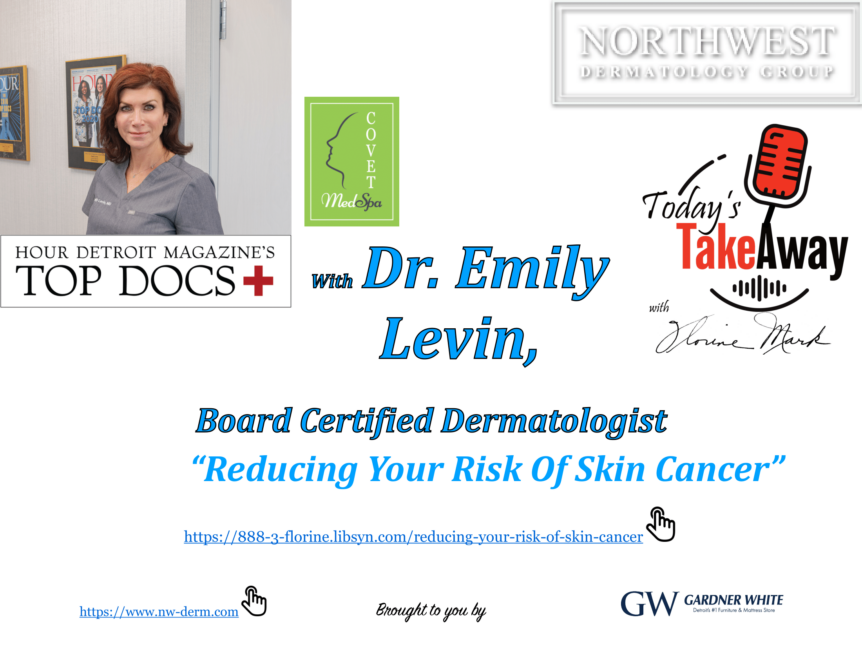With Dr. Emily Levin, Board Certified Dermatologist, & Florine Mark
Did you know that skin cancer is the most common type of cancer in the United States with a one in five chance of being diagnosed with it during your lifetime? When diagnosed early, basal cell or squamous cell carcinomas tend to be low-risk and readily treatable. But the third type of skin cancer, Melanoma, is far more aggressive and harder to treat. Skin cancer is typically caused by excessive exposure to the sun and is the body’s reaction to damage caused by ultraviolet rays.
As we age, skin cancer tends to be more prevalent, but in addition, certain genetic factors can increase our risk of developing skin cancer. For example, men have a higher incidence of skin cancer than women. Caucasians with fair skin are more at risk as are individuals with a family history of the disease. Finally, certain medications or medical procedures such as radiation treatments may actually increase the likelihood of developing skin cancer.
But as much as we love being outdoors, especially during this time of year, there are steps we can take to reduce our risk of skin cancer exposure. In addition to applying creams and lotions with a Sun Protection Factor (SPF) of 30 or higher, it is recommended that we avoid direct sunlight between the hours of 10:00 am and 4:00 pm when the sun is strongest and wear sunglasses.
Furthermore, cover your face with a broad-brimmed hat and shield your arms and legs with long-sleeved shirts and pants. For added protection, you can also wear specially designed clothes treated with built-in UPF 50 or Ultraviolet Protection Factor to prevent the sun’s rays from touching your skin. Also, it is a myth that tanning beds and sun lamps are safer than being outdoors. In fact, the opposite is true, due to the concentration of UV rays in these devices, they actually pose a greater risk for cancer.
Finally, it is strongly suggested that you schedule an annual skin care full body scan with your dermatologist to evaluate and monitor any signs of moles or lesions that could indicate cancer cells.
But as much as we love being outdoors, especially during this time of year, there are steps we can take to reduce our risk of skin cancer exposure. Last year, Florine interviewed Dr. Emily Levin, board-certified Dermatologist, and cosmetic surgeon. In addition to talking about skin cancer prevention, Dr. Levin provides some very helpful information about caring for our skin throughout our life.
What You’ll Hear on This Episode:
- When did Emily decide she wanted to be a dermatologist?
- How does our complexion change as we age?
- Why antioxidants are so important for our skin.
- How can we uplevel our daily skincare routine?
- How does our diet affect our skin and complexion?
- What should we be looking for in our sunscreen?
- Do collagen supplements and topical creams really work?
- What skincare products should everyone be using?
- Breaking down the different types of Retin-A.
- What should a daily/nightly skincare routine look like?
- What is Botox used for?
- What are fillers used for?
- What are the best products to use to grow eyelashes?
- What products are available for thinning hair?
- What are the three most important things we can do to care for our skin at any age?
Today’s Takeaway:
We all want to spend more time outdoors but remember that even though sunshine feels good on our faces, we can do irreversible damage if we don’t wear sunscreen. In addition to prematurely aging our skin, we might also be putting ourselves at risk of developing skin cancer. And it’s not just the sun that can cause damage to our skin. Winter weather can also worsen certain conditions like Psoriasis. So, the next time you visit your dermatologist to address skincare issues and get your annual body scan, why not come prepared with a list of questions on how to adapt your skincare routine throughout the year? Your dermatologist will have all the answers. I know mine does (Hint: it’s Dr. Emily!)
Just as our bodies age, so does our skin and we need to care for it differently than we did when we were younger. That means different skincare products and regimens. It may take time to show the results, but if we follow the proper care guidelines the differences will be worth it. Remember, every day is a gift. Make the most of every day. Eat properly, exercise, and see your doctors for all of the necessary annual exams. When we care properly for our skin, we’ll not only look better but we’ll help reduce our risk of skin cancer. Be healthy, everyone. I’m Florine Mark and that’s “Today’s Takeaway.”
Quotes:
“My friends in high school used to joke that I was going to be a dermatologist someday.”
“I kept gravitating towards medicine and when I was in medical school dermatology was just calling my name. I continued to be fascinated by the skin. You can see it, it’s tangible, you know when things are getting better or worse and I just love it.”
“The skin changes in many ways as we age, but there are certain things we should always be doing from a young age all the way through the decades of our lives.”
“Sunscreen is the most critical, #1, anti-aging, skincare prevention item that is out there.”
“Sunscreen is the one item that everybody should be using.”
“Catching skin cancer early is critical. It’s critical.”
“You have to be careful with regular soap because soap can be very harsh.”
“Eating a diet filled with antioxidants is wonderful for your skin.”
“The one sunscreen that you will use is the one you should pick.”
“There’s no reason to use any SPF under 30.”
“I love Botox!”
Brought to You By:
Mentioned in This Episode:


